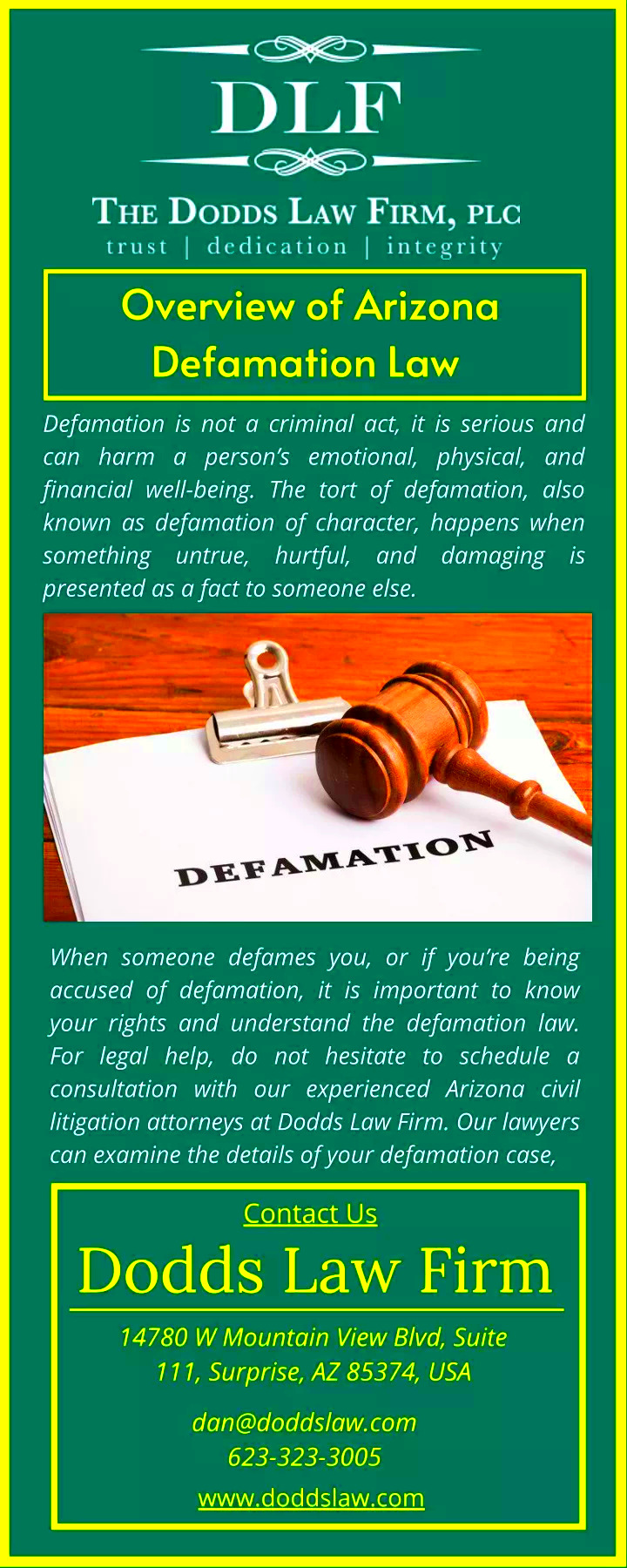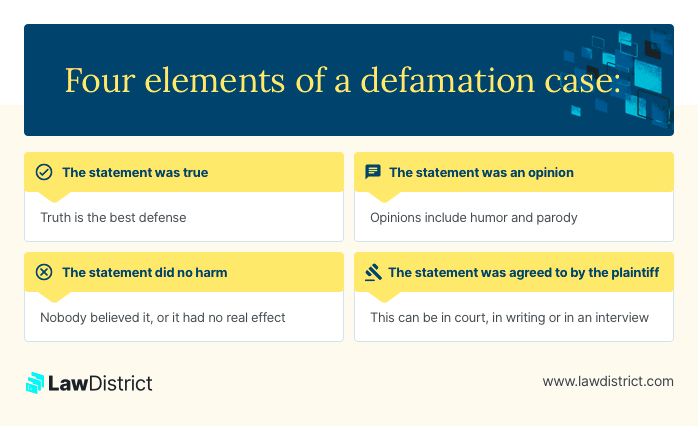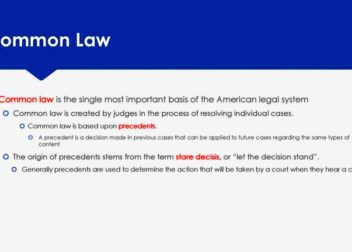Arizona Libel Law and Defamation Claims Explained
Libel and defamation are terms often thrown around in conversations about legal issues, but they have specific meanings. In simple terms, defamation refers to any statement that harms a person’s reputation. This can be divided into two categories: libel and slander. Libel refers to defamatory statements made in a permanent form, such as written words, while slander refers to spoken defamation.
In Arizona, understanding the difference is crucial for anyone considering a defamation claim. The state has specific laws and regulations that govern these cases, and knowing your rights is the first step toward seeking justice. If you think someone has made false statements about you that caused harm, it’s essential to understand how the law views these actions.
Key Elements of Libel Claims in Arizona

To win a libel claim in Arizona, you need to prove several key elements:
- False Statement: The statement made must be false. Truth is a defense against libel.
- Publication: The false statement must have been published or communicated to at least one other person.
- Identification: The statement must identify you, meaning it’s clear that the statement refers to you.
- Fault: You must show that the publisher of the statement was at fault. This often means proving negligence or actual malice.
- Damages: You need to prove that you suffered harm as a result of the false statement.
These elements work together to form the basis of a libel claim in Arizona. Understanding each component is vital for anyone considering legal action.
Proving Damages in Defamation Cases
In defamation cases, proving damages can be one of the most challenging aspects. Unlike some personal injury cases, where damages might be straightforward, defamation requires you to demonstrate how the false statement has harmed you. Here are some common types of damages you can seek:
- General Damages: These are non-economic damages that cover harm to your reputation, emotional distress, and other subjective harms.
- Special Damages: These are quantifiable financial losses, such as lost wages, lost business opportunities, or costs incurred due to the defamation.
- Punitive Damages: In cases where the defendant acted with actual malice or extreme negligence, you might seek punitive damages, which are designed to punish the wrongdoer.
It’s essential to gather evidence to support your claims for damages. This might include:
- Testimony from witnesses
- Documented financial records
- Psychological evaluations
By presenting a clear picture of how the libelous statements affected your life, you can strengthen your case and improve your chances of a successful outcome.
Defenses Against Libel Claims
When facing a libel claim, it’s essential to understand that there are several defenses available that can help protect you. A strong defense can mean the difference between a costly judgment and a dismissed claim. Here are some common defenses against libel claims:
- Truth: If you can prove that the statement in question is true, this is an absolute defense against a libel claim. Truth holds strong in court.
- Opinion: Statements of opinion, rather than fact, are generally protected under the First Amendment. If your statement is clearly an opinion, it may not be actionable.
- Privileged Statements: Certain statements made in specific contexts, like court proceedings or legislative debates, may be protected by privilege.
- Consent: If the plaintiff consented to the publication of the statement, it may negate their claim.
- Hyperbole or Satire: Exaggerated statements or satirical comments, if clearly understood as such, can be defended as non-defamatory.
Each case is unique, and the applicability of these defenses will depend on the specific circumstances of the libel claim. Consulting with a legal expert can help you determine the best strategy to defend against a libel suit.
Comparing Libel and Slander in Arizona
Understanding the differences between libel and slander is crucial for anyone involved in defamation claims in Arizona. While both terms relate to false statements that harm someone’s reputation, they differ in form and legal implications.
| Aspect | Libel | Slander |
|---|---|---|
| Definition | Written or published defamatory statements | Spoken defamatory statements |
| Form | Permanent (e.g., articles, books, social media) | Temporary (e.g., conversations, speeches) |
| Proving Damages | Presumed damages; easier to prove | Need to prove specific damages |
| Examples | Newspaper articles, blog posts | Comments made in a casual conversation |
Recognizing these differences helps you understand your rights and options when dealing with defamation claims. If you’re involved in a situation that may lead to a defamation claim, consulting a lawyer can provide clarity and guidance.
The Role of Actual Malice in Defamation Cases
In defamation cases, particularly those involving public figures, the concept of actual malice plays a vital role. Actual malice refers to the knowledge that a statement is false or the reckless disregard for whether it is false or not. This standard is crucial for public figures and officials because it helps balance the right to free speech with the need to protect reputations.
Here’s how actual malice affects defamation claims:
- Public Figures: For public figures to win a defamation claim, they must prove actual malice. This means they need to show that the defendant either knew the statement was false or acted with reckless disregard for the truth.
- Private Individuals: In most cases, private individuals only need to show negligence, which is a lower standard than actual malice. This distinction highlights the different levels of protection based on a person’s public status.
- Importance of Evidence: Proving actual malice requires strong evidence. This could include emails, text messages, or testimony that demonstrates the defendant’s mindset at the time of the statement.
Understanding the role of actual malice can significantly impact the strategy for both plaintiffs and defendants in defamation cases. It’s always best to consult with a legal professional to navigate these complex issues effectively.
Filing a Defamation Claim in Arizona
If you believe you’ve been a victim of defamation in Arizona, it’s important to understand the process of filing a claim. This journey can feel daunting, but knowing the steps can help simplify things. Here’s a breakdown of how to file a defamation claim:
- Consult an Attorney: Start by discussing your situation with a lawyer who specializes in defamation. They can help you understand your rights and evaluate the strength of your case.
- Gather Evidence: Collect all relevant evidence, such as the defamatory statements, any witness testimonies, and proof of damages. This information is crucial for your case.
- Determine the Type of Defamation: Identify whether your case falls under libel or slander, as this will affect your legal strategy.
- File a Complaint: If your attorney believes you have a valid case, they will help you draft and file a formal complaint in the appropriate court.
- Discovery Process: Once the complaint is filed, both parties will engage in discovery, which involves exchanging evidence and information.
- Negotiation and Settlement: Many defamation cases are resolved through negotiation. Your attorney will help you negotiate a fair settlement if possible.
- Trial: If no settlement is reached, your case may go to trial, where a judge or jury will decide the outcome.
Each case is unique, and having a knowledgeable attorney by your side can make a significant difference in navigating this process smoothly.
FAQ about Arizona Libel Law
Understanding Arizona’s libel law can be challenging, so let’s address some common questions that may help clarify things for you:
- What is the statute of limitations for filing a defamation claim in Arizona?
- The statute of limitations for defamation claims in Arizona is generally one year from the date of publication.
- Can I sue for defamation if I’m a private individual?
- Yes, private individuals can sue for defamation. However, you must prove that the statement was false and caused harm.
- Do I need to prove damages in a libel case?
- In libel cases, damages are often presumed, but you can still present evidence of specific harm to strengthen your claim.
- What should I do if I receive a defamatory statement?
- Document the statement, gather evidence, and consult a lawyer to discuss your options.
- Are there any defenses against a libel claim?
- Yes, common defenses include truth, opinion, privilege, and consent.
These FAQs can serve as a helpful guide as you navigate the complexities of Arizona’s libel laws. If you have more specific questions, consulting with a legal expert is always a good idea.
Conclusion on Arizona Libel Law and Defamation Claims
In conclusion, Arizona’s libel law provides individuals with a means to seek justice against false statements that harm their reputation. Understanding the key elements of defamation claims, the defenses available, and the process for filing a claim can empower you to protect your rights. Whether you are a public figure or a private individual, knowing your legal standing is crucial.
Defamation can have serious consequences, both emotionally and financially. If you believe you have been wronged, it’s essential to act quickly and consult with a qualified attorney who can guide you through the legal process. Remember, every situation is unique, and having expert legal advice can make a significant difference in your case’s outcome. Stay informed, and don’t hesitate to seek help when you need it!


